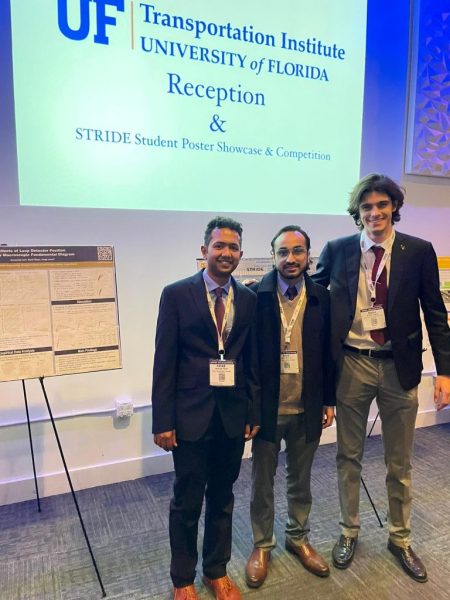
CCEE Ph.D. students Subid Ghimire and Abdullah Al Farabi won second and third place, respectively, in the Southeastern Transportation Research, Innovation, Development and Education Center 2023 Poster Showcase & Competition on January 9 in Washington, D.C.
Posters were showcased and judged online and physically displayed during the University of Florida Transportation Institute Reception.
“It was a great experience to present my research and successfully represent our team. Winning second place in the competition assures me that the research I do at CCEE is valuable to academics, practitioners and society in general.”
Subid Ghimire, Ph.D. student
“It feels great to win a prize in a competition,” Al Farab said. “This prize came out from the very first research project I worked on, and it definitely is a motivating achievement for me.”
Ghimire’s poster, “Spatial & Temporal Characteristics of Microtransit Trips: A Case Study of Wilson,” highlighted research on the spatio-temporal differences in the use of microtransit service in Wilson, North Carolina, and explored factors that would be associated with greater use of microtransit and how factors vary across space and over time.
“Microtransit is a mobility option that combines the characteristics of traditional buses and ride-hailing services like Uber and Lyft,” said Ghimire, who is advised by Dr. Eleni Bardaka. “Unlike Uber and Lyft, it is a public transportation service where users share their ride with other unknown users while paying a nominal fee (or sometimes free). Unlike the traditional buses, users request a ride and get one on-demand, just like Uber and Lyft. Understanding the determinants of microtransit demand is of significance not only to transit planners in Wilson, but for transit agencies across the U.S. that are considering the implementation of microtransit to improve their transit service delivery.”
Ghimire’s research primarily focuses on travel demand modeling, travel behavior analysis and policies associated with sustainable and equitable mobility options.
Al Farabi’s poster was titled “Integrated Corridor Management by Cooperative Traffic Signal & Ramp Metering Control.”
“We developed a demand-responsive control methodology that jointly optimizes signal timings and ramp-metering plans to reduce traffic congestion in an urban corridor,” said Al Farabi, who is advised by Dr. Ali Hajbabaie. “We found that our cooperative control framework can significantly improve corridor performance when compared to traditional traffic control systems.”
Al Farabi’s research focuses on developing optimization-based methodologies to improve Connected and Automated Vehicles (CAVs) driving environments.
“I am super excited to extend our work and implement efficient algorithms into self-driving cars. Working on such cutting-edge transportation issues thrills me, and I’m happy to contribute to developing an efficient transportation system.”
Abdullah Al Farabi, Ph.D. student
